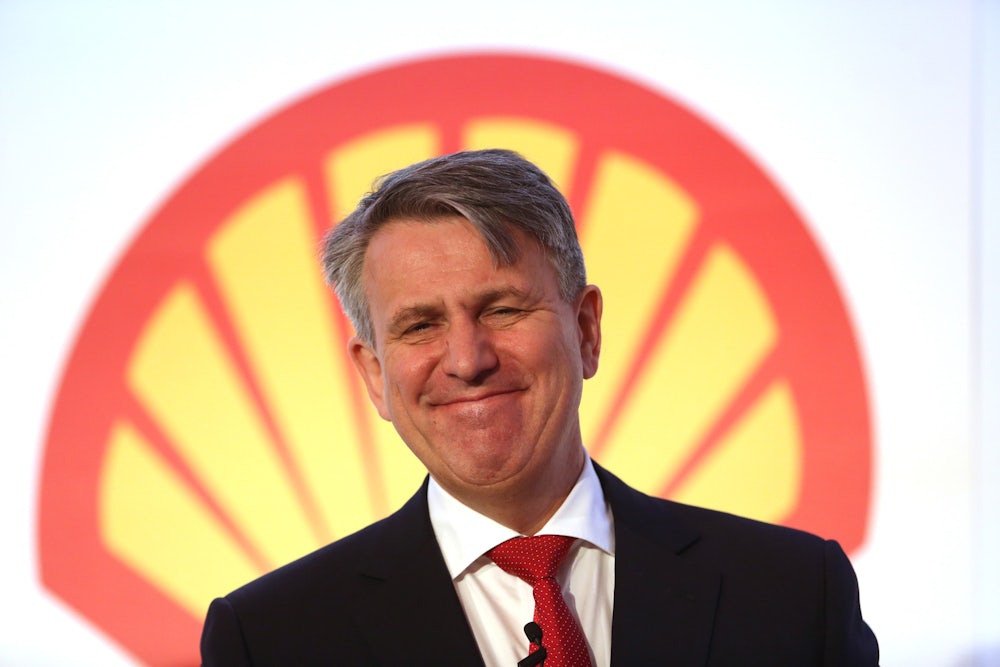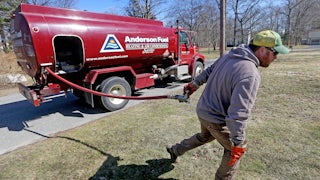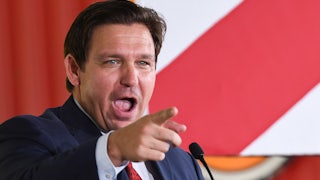The climate crisis is not, unfortunately, the product of a few evil CEOs waking up every day and deciding to pour greenhouse gases into the atmosphere for profit. Its causes are structural, and can be traced back through centuries of colonial plunder and imperial excess. That said, the top executives at the world’s largest fossil fuel companies bear a grossly outsize responsibility for driving up emissions, polluting our politics, and delaying action for decades the world won’t get back. And they tend to be whiny jerks. Case in point: outgoing Shell chief Ben van Beurden.
In early December, the Oversight and Reform Committee investigating fossil fuel company disinformation on climate change released a new 1,200-page trove of documents. The haul was gathered from major fossil fuel companies and a major trade association for the industry, the American Petroleum Institute. The files obtained from oil and gas supermajor Shell show top brass at the multinational company whining about journalists who write unfavorable stories about them and getting worked up over tweets.
The man at the top is equally petty. CEO Ben van Beurden made a point of complaining in an October 2017 email about comments given by longtime Environmental Defense Fund head Fred Krupp at a panel on which the two had just appeared. Krupp, though an environmentalist, has nurtured close ties to corporate America, including fossil fuel companies, under his leadership at EDF. But at a 2017 panel hosted by the Oil and Gas Climate Initiative, or OCGI—a coalition of major oil and gas companies aligned around the vague commitment to reduce greenhouse gas emissions somehow, someway—Krupp apparently dared to cite numbers stating that methane emissions from gas might undercut industry claims about it being a climate savior. A five-year research study conducted by EDF found that oil and gas industry methane emissions were almost 60 percent higher than those found by the Environmental Protection Agency.
Reporting at the time quoted Krupp urging companies to go beyond current commitments and do more to reduce their methane emissions, to “work towards near-zero methane emissions from the gas value chain.”
“If you ask: ‘Is today’s announcement enough?’ Then I would say: ‘No, not by a long shot,’” Krupp said. “There is a lot more that can and should be done.”
Shell execs apparently went ballistic. “Almost all of the CEOs on the panel looked shocked, if not mad, with Fred’s statement,” former Shell VP Angus Gillespie wrote in an email. Van Beurden was so mad about the comments that he canceled a meeting Krupp had requested with him. Krupp, Van Beurden wrote, was “essentially pointing out that if you burden the gas value chain with all the emissions of the oil industry, it would put gas on par with coal.” The comments went “one step too far for me,” he added in an email to other higher-ups at the company. “I felt I should not reward him with a meeting, not in the least as I am not sure anymore we can rely on him to be honest about reflecting the input we give them.” He also wanted his position to be known if Krupp reached out to anyone else on their team. “I am quite OK for Fred to know I was mightily disappointed in his disservice to the good efforts we in principle stand shoulder to shoulder on.”
Bruce Culpepper—then the Shell U.S. country chair and president of Shell Oil Company, now retired—had a “candid and constructive conversation” with Krupp the following month to “convey our collective displeasure regarding his remarks at the end of the OCGI conference,” as he told colleagues in an email. Culpepper “conveyed serious concerns about this type of public comment eroding our relationship and ability to work together on methane,” accusing EDF of “moving the ‘goal posts’ on companies like us who are sincerely trying to do the right things to address this important issue.” Krupp was, he reported, “upset and concerned” about having angered Van Beurden and wanted to “address and restore.” He acknowledged that his comment, “while factually correct in EDF’s view and representative of the larger issue, was ill placed and out of context with the specific discussion on the positive benefits of gas.”
After the Oversight Committee released its emails last week, Krupp told Politico that he had talked to Van Beurden since then, “noting some companies have begun to address methane leaks—but that the industry as a whole still emits too much.”
Van Beurden’s comments on this alone make him sound like a spoiled boy prince—after all, Krupp was correct about the methane emissions released all along the gas supply chain. But other revelations from the Oversight Committee’s documents are more damning. Over the last several years, outlets including Bloomberg have reported on major oil companies selling off their most polluting, least attractive drilling assets to smaller and less scrutinized companies. While the emissions from those operations are moved off Shell’s books, the operations aren’t generally shutting down. Instead, the emissions have either continued apace or even grown.
Noting a Bloomberg report that the buyer of BP’s Alaskan assets, Hilcorp Energy Co., planned to maintain operations at full capacity, Shell U.S. and Brazil Media Manager Curtis Smith in 2019 owned up to the fact that sales are a wash for the environment. “True, we transfer CO2 liability when we divest,” he said over email, going on to argue that it’s the same as when oil demand is met by other countries that have “far fewer regulations than we do in a modern, civilized society.”
BP admitted about as much in the documents it provided to the committee. Divestments, BP’s Elizabeth Jackson wrote to colleagues last year, “enable us to strengthen our balance sheet and high grade or diversify our portfolio,” and use sales to fund low-carbon investments. “While these divestments may not directly lead to a reduction in absolute global emissions, they accelerate the pace bp can grow low carbon businesses and underpin our aim to reduce our oil and gas production by around 40% by 2030. This puts us well on our way to becoming a net-zero company by 2050 or sooner.” A subsequent investigation by Bloomberg found that the boost in production at the former BP site undertaken by Hilcorp corresponded to an 8.2 percent rise in emissions, “about as much as 108,000 internal combustion cars in the U.S. produce in a year.” In other words, BP was making itself look good, but in ways that were increasing overall emissions into the atmosphere.
Shell’s files show managers like Curtis Smith and others acknowledging this reality, and arguing that no one could possibly expect them to behave any differently. “What are we supposed to do instead of divesting,” Smith’s colleague Anna Arata wrote back to him, “pour concrete over the oil sands and burn the deed to the land so no one can buy them?” Arata mused in a parenthetical that, “in a perfect world, governments would step in to administer buybacks of dirty resources, but that probably wouldn’t be a popular expenditure when that cash could be used for, um, anything else.”
Actually, the process that Arata is describing is, in a sense, nationalization. But that would probably mean absorbing at least some of Shell’s profits along with its dirty by-products.
Nationalization is not yet on the immediate political horizon in the United States. But Shell and its colleagues in the oil and gas industry may yet push politicians to take that step, if they continue alienating the public at this rate. Van Beurden got a roughly 25 percent pay bump last year, making $8.2 million as people around the world paid more for fuel from which Shell is making record profits. He’ll get another $1.64 million after stepping down at the end of the year.






